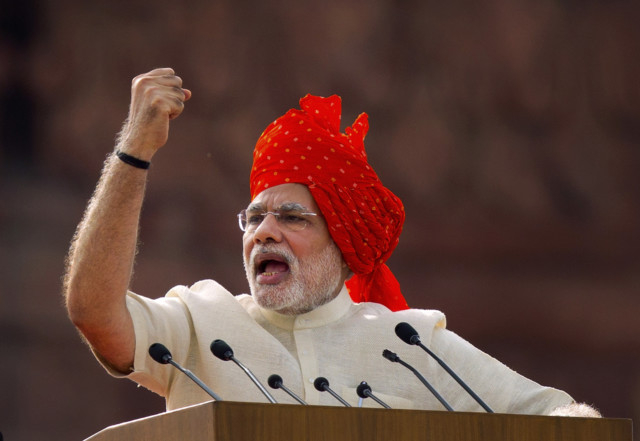Narendra Modi has three problems. America doesn’t care much about him, China’s bullying knows no bounds and Pakistan is itching to avenge the unilateral cancellation of Foreign Secretary level talks by New Delhi.
After denying Modi entry for years, citing his role in the mass murder of Gujarati Muslims, Washington recently granted him passage primarily to serve the interests of US corporates eyeing markets in the second-most populous nation. The Hindu Right has misread the lifting of the travel ban and wants to cosy up to the superpower. But the United States is so disinterested that it hasn’t even appointed an ambassador to India! I would advise Modi not to set foot in America until President Barack Obama posts an ambassador.
But does Modi have the guts to redline America? It’s a legitimate question because in the Indian narrative, foreign secretary talks with Pakistan were scrapped after Pakistan was found guilty of violating a “red line” Modi had laid down no sooner he assumed office. After my last piece, a Dubai resident rated me as the “worst” journalist covering India for Gulf News. He was perturbed by my remarks and observations about Modi and the Indian government in successive columns. His contention was seconded by a resident from Abu Dhabi. Let me share an anecdote with both gentlemen and others who might be angry with me for repeatedly slamming Modi and his government.
The anecdote is about M. J. Akbar, my first boss who recently joined the BJP for reasons he alone knows. As editor of The Telegraph, Kolkata’s largest-selling English newspaper, Akbar never missed an opportunity to criticise La Martiniere, the city’s leading girls’ school. The school’s lapses were highlighted in news stories as well as the occasional editorial. One day, the school principal told the newspaper’s Education correspondent that the “negative coverage” was inexplicable as Akbar’s daughter studied in La Martiniere. When the principal’s remark was conveyed to Akbar, he retorted: “I’m merciless because I have a personal stake in La Martiniere — I want it to be the best school in the whole world!”
Like my guru Akbar, I’m pitiless because I have a personal stake in Modi-ruled India — my motherland. I want India to be the best place on earth — a strong yet principled nation that every country envies and wants to emulate.
Unfortunately, Modi’s internal and external policies pose a threat to religious minorities living in India and smaller countries in the neighbourhood. The Prime Minister’s authoritarian-cum-sectarian disposition is bound to land India in grave trouble, I’m afraid.
Modi’s decision to call off India-Pakistan foreign secretary talks scheduled for August 25 in Islamabad is a dangerous step. Nothing can be more ridiculous than India’s stated reason for cancelling the Sujatha Singh-Aizaz Ahmad Chaudhary engagement — a tea meeting between Indian Kashmiri separatist leaders and Pakistani High Commissioner Abdul Basit in Delhi ahead of the Islamabad event. Kashmiri Hurriyat representatives have been meeting Pakistan’s envoy and visiting Pakistani leaders in the Indian capital and elsewhere for decades to resolve what’s a tripartite dispute according to United Nations. But Modi suddenly accused Pakistan of crossing a “red line” and ordered Singh not to go to Islamabad for a pre-arranged meeting with her Pakistani counterpart.
Short-sighted approach
Modi, in my opinion, has put the BJP‘s and his personal interests above India’s. He acted as a short-sighted BJP leader rather than the Prime Minister of India. In Modi’s and his alter ego, BJP president Amit Shah’s calculation, shadow-boxing with Pakistan will unify Hindu voters in Jammu & Kashmir ahead of provincial elections, ushering in a BJP government in India’s only Muslim-majority province for the first time. Modi obviously also thinks that talking tough with Pakistan will enhance his image as Hindu Hriday Samrat, or Emperor of Hindu Hearts.
The problem with shadow boxing is that it’s already escalating tension along the troubled India-Pakistan border which might degenerate into limited or even large-scale fighting. Violations of ceasefire along the Line of Control are already at a record high. These are dangerous portents. Is India walking into a carefully laid Pakistani trap? According to the Intelligence Bureau’s Multi-Agency Centre (MAC) latest assessment, there are allegedly 34 active terrorist training camps in operation in Pakistan across the border with India. Naturally, India has identified 100 high-value targets to train its guns on if attacked. So all the ingredients for deadlier clashes between the Indian and Pakistani armies and their proxies are in place.
Modi called off India-Pakistan talks to suit his political and personal objectives. But he will be compelled to resume the dialogue under international pressure if an armed conflict between nuclear neighbours spreads beyond a point and world powers like the United States, the UK and the EU inevitably step in. Returning to the negotiating table under international pressure will dent India’s image as a nuclear power and send the message that India tried to bully Pakistan but failed.
Modi went after Pakistan hammer and tongs while canvassing for votes.I wrote before the elections that if Modi wins he will have to come out of his make-believe world and engage constructively with Pakistan. One would have hoped that two new entrants to the BJP would do a great service to the new PM by bluntly telling him that Pakistan is no pushover — and that India cannot overrun Pakistan as it has a professional army and nuclear weapons. The two men are V.K. Singh, who headed India’s armed forces until mid-2012, and Sanjeev Tripathi, former chief of the Research and Analysis Wing (RAW), India’s external intelligence agency. I wonder if they have truthfully told Modi that an India-Pakistan war will result in nothing else but a strategic impasse.
Therefore, war is not an option — only talks are.
S.N.M. Abdi is a noted Indian journalist and commentator. He can be contacted at snmabdi@yahoo.com.









